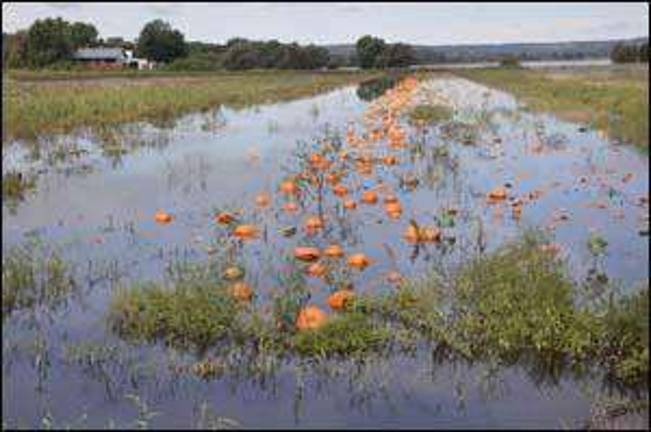Flooded farmers to officials: 'We need help now!'

For now, the only aid is coming from fund raisers and loans farmers say they can't repay Goshen - Local farmers affected by flood damage gathered at the Goshen Emergency Services Center to speak their minds. What they got in return was mostly an earful of "Be patient." Officials caught in their own web of bureaucratic rules, made a heroic effort to present resources. Unfortunately, the only real resource for most of the farmers is low-interest loans from farm credit unions, and help from fundraisers organized in their own communities. Officials from the Federal Emergency Management Agency (FEMA) said the agency provided aid to homeowners and small businesses only. Because of the severity of the recent flood, FEMA officials are seeking an exemption for farmers. But many desperate farmers say a motion by Congress will take far too long. No fewer than eight government agencies described their resources and noted that Governor Cuomo has requested added federal funding beyond the first $15 million relief fund. Officials said they are also seeking a temporary rule change for NAPP, the agency that provides crop insurance, so that farmers can buy it retroactively for this year. During the brainstorming and informational session, word came that U.S. Rep. Nan Hayworth had been appointed head of a bipartisan commission to procure resources and coordinate efforts. Officials noted that housing for farm workers owned by farmers would not be covered, only the farm owner's primary residence and the workers' possessions. Many farmers had not gotten NAPP coverage because in recent years it has become prohibitively expensive and yielded poor returns, in some cases barely covering the cost of the coverage. Mitigation for town and county agencies is expected to be generous and may occur in several rounds. Funded by Congress, it is provided to help improve infrastructure, and to reopen culverts, bridges and the like. Meanwhile the state Department of Agriculture and Markets said it will reach out to 15 additional funding agencies to get aid for cash-strapped farmers "by unconventional routes." The agriculture department stressed the importance of assessing and documenting losses in detail, just in case additional unexpected funding becomes retroactive. But the reality for many farmers is that the only relief they'll see is from loans from farm credit agencies and other lending institutions. "Come see us, or go see a banker," Blaine Allen of Farm Credit East advised farmers. "There are many emergency low-interest rate loans that can be obtained, sometimes for up to 20 years, as well as the option to restructure existing loans." But several farmers were angered by this advice. "The last thing we want to hear about today are any loans that we can't afford to repay," one said. Another farmer from Ulster County chimed in. "We have dead cattle, goats and horses floating down the river," he said. "What are you going to do about that?" He was told that farmers can get repayment for livestock as long as their ownership and losses are well documented. They have 60 days to report missing livestock. Another said that the Ulster Vegetable Growers met earlier that morning and wanted to send a message about their needs. It went like this: "How are we going to get back in business? Our topsoil is in the Hudson River." Farmers said the alphabet soup of agency acronyms was confusing. One official said, "That's our hell too." Another agency, Emergency Conservation Funding, may be able to funnel money to the farmers for immediate cleanup, such as clearing out ditches and restoring fields. Administrators cautioned: "We will try to be creative with our solutions, but priorities must be considered to distribute the funding where it will be most useful. If we're not careful we could spend the entire amount at one farm." The Soil and Conservation District said it has money available but this too is slated for field and barnyard repair, and not crops. Counselling will be offered to people whose health has been affected. Advice is also available on how the crops must be treated. There is compensation for dairy farmers who had to dump milk, recommendations for safety testing, and guidelines on which vegetables may still be sold or consumed. Vegetables touched by flood waters should not be sold. Orange County Legislator Tom Pahucki, a longtime advocate for farmers in the Black Dirt region, continued to press for a more permanent solution to alleviate the flooding of the Wallkill River. Furious that this impending disaster was not foreseen and prepared for, Pahucki said, "We need to dig the Wallkill. We chase the rabbit instead of going to the heart of the matter.... Six inches of rain and we're up to our banks. We've had six floods in five years. It's time to put people first instead of frogs and lizards". A comprehensive list of resource agencies can be found on the state's Agriculture and Markets Web site at www.agmkt.state.ny.us.